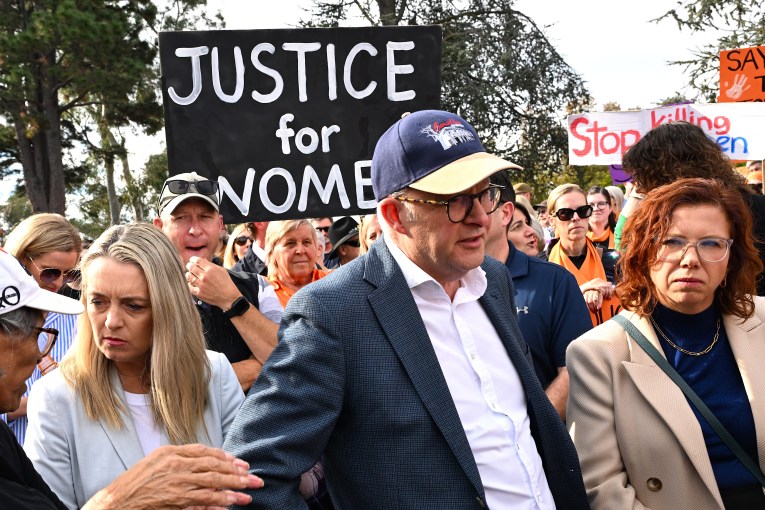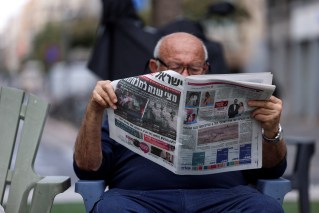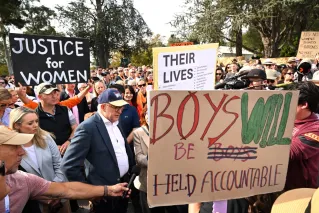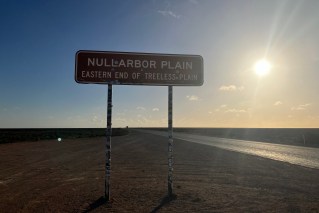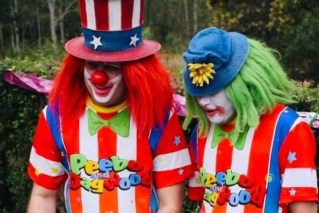As Premier tries to kick start her leadership, will it be from Paris, William Street or Inala?
Annastacia Palaszczuk thinks her re-election chances will get a boost with a trip to Paris late next July. Dennis Atkins says it’s a powerful reason why she’s unlikely to walk from her job.

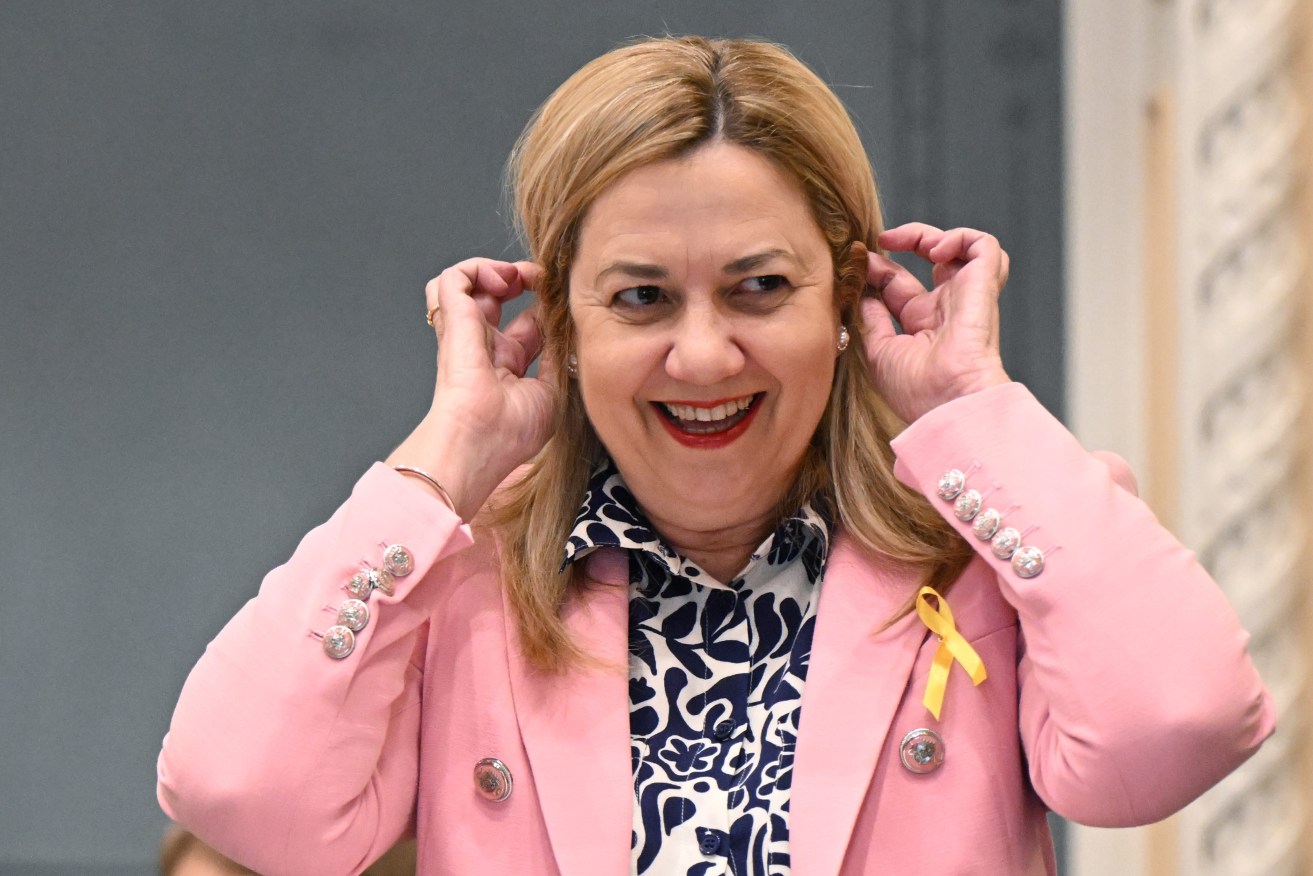
Queensland Premier Annastacia Palaszczuk is seen during Question Time at Queensland Parliament House, in Brisbane, Tuesday, September 12, 2023. (AAP Image/Darren England)
History is a good – if never perfect – guide to how political events play out. Politicians and political parties are seldom creative or imaginative, which might explain the tumble-down, clown act their behaviour often resembles.
People plotting, scheming, dreaming and postulating about the future of Queensland Premier Annastacia Palaszczuk (yes, this column’s been there) should dust off some old files from the last months of the Howard Government. Doing so provides myriad clues to what might play out in Queensland over the coming year.
Leading up to the 2007 federal poll many Liberal politicians and operatives worried their four-election winning conqueror John Howard didn’t have another victory up his sleeve. Peter Costello was the pick but he had the heart the size of a pea and was unwilling to take the risk of cutting down his leader. He wanted the prize handed to him.
Donning the cloak of Machiavelli was foreign minister Alexander Downer who played internal party politics unrelentingly hard. Downer petitioned his boss, talked with the prime minister’s wife Janette, and bent the ears of ministers, MPs and party officials in corridors and back rooms. It was all to no avail. Howard wouldn’t budge.
The conventional wisdom was Mrs Howard put her foot down, insisting any move against John would be undeserved and impertinent.
Some much closer to Howard say it was his own stubbornness that kept him from giving any quarter – and he had a singular purpose.
Howard eyed a meeting of world leaders in Sydney – the Australia Pacific Economic Cooperation forum, known as APEC – with 21 nations attending from powerhouses the United States, the Russian Federation and the People’s Republic of China to Papua New Guinea and Brunei Darussalam.
Howard wanted the walk with his “man of steel” mate George W. Bush down Macquarie Street and the line-up of world leaders on the steps of the Opera House – everyone enjoying the early September sunshine in long Driza-Bone coats.
There’s no denying the power surge leaders feel when they strut the global stage. Even “DJ Albo” Albanese gets a lift in his shoes.
The counterfactual, the “what-if”, the departure of Howard just weeks out from the 2007 election might have caused is impossible to gauge. Labor’s Kevin Rudd managed to rain on Howard’s APEC parade by heading to the inner north-western suburban electorate of Bennelong (the prime minister’s own), talking to Chinese locals in Mandarin.
What this tells us today is Palaszczuk is highly unlikely to step away from being premier before the election next October.
There are several reasons why. Foremost is she doesn’t want to quit and she thinks she can still weave the magic she managed at her two previous re-elections in 2017 and 2020, both of which can be rightly called against the odds victories.
Palaszczuk believes in herself and rates herself ahead of any colleagues, including the most talked about rivals, deputy Steven Miles and health minister Shannon Fentiman. She thinks she can sell herself again to the voters.
Many in Labor, and more outside observers, see this as delusional. They say the brutal issues, topped by youth crime, economic struggles and a health system running way below par, will run her down.
Also, the swirling controversy that dogs her relationship with colourful Brisbane surgeon Reza Adib has eaten into her famous common, relatable touch. Palaszczuk is carrying more weight into this coming contest than Phar Lap lugged in the 1931 Melbourne Cup.
Regardless, she has a plan. Palaszczuk believes a big spending budget next June – fed by migration growth from overseas and interstate and revenue from booming mining royalties – will go a long way to rekindle the affection of disgruntled voters.
It’s an ambitious goal – some might say it adds to that perception of delusion.
Palaszczuk believes she has something up her sleeve just as Howard thought a parade of world leaders in Sydney in 2007 would inspire voters: the meeting of the International Olympic Committee in Paris in July next year just before the gala opening ceremony of the 2024 Summer Games in the City of Lights.
South East Queensland is hosting the 2032 Games with the historic – soon to be controversially demolished and redeveloped – Gabba Stadium at its core. Palaszczuk regards securing of the Games in Tokyo in late 2021 as one of the key achievements of this past term.
Along with Brisbane Lord Mayor Adrian Schrinner, then federal sports minister Richard Colbeck and Australian Olympics Committee chairman John Coates, Palaszczuk flew to Japan to make a final pitch at the delayed 2020 Tokyo Games which were held without audiences in a city that was all but locked down because of the persistent coronavirus.
She wants to reprise that moment in Paris, using it to burnish her leadership and what she sees as a role as the Olympics champion, albeit just organisationally.
Maybe it works or maybe it doesn’t but anyone inside the state Labor Party needs to understand the depth of Palaszczuk’s commitment to staying.
This is not to say there’s zero chance of her walking out one day and announcing an early and immediate departure, just as former ALP premiers Daniel Andrews and Mark McGowan did during 2023.
However, the weight of money is on Palaszczuk staying. Also, anyone thinking of pushing her or moving against her needs to imagine what that might mean.
It might seem like a good idea to take down someone seen as an unpopular leader but what the cognoscenti see as a good idea does not necessarily match how these things are seen in the cafes, work crib rooms, around the work canteen queues or just in the street and across kitchen tables.
If Labor are having these thoughts they should check with some federal colleagues who were around in 2010. They’ll report a majority of members might have thought it was an act of genius to cut down the unpopular, unpleasant and irascible Kevin Rudd, the wider public were shocked and resentful.
The ground to remove Rudd hadn’t been prepared and voters – especially in Queensland – didn’t understand or like any of it. Labor paid a price when the new prime minister Julia Gillard asked for a mandate.
A final observation is that Palaszczuk’s terrible polling numbers are not necessarily baked in. There’s a global phenomenon in politics – and it’s been around for more than a decade – that reflects the gloomy nature of the economy and global security with the 2008 financial crisis marking its origins.
If Palaszczuk wants to turn things around she needs to not just talk about refreshing her government, resetting her ambitions and goals and reconnecting with voters in a genuinely relatable way but actually do it.
She could start by reminding herself of how her political life began and acting like the Member for Inala and not a premier who views the world from the lofty heights of One William Street.
